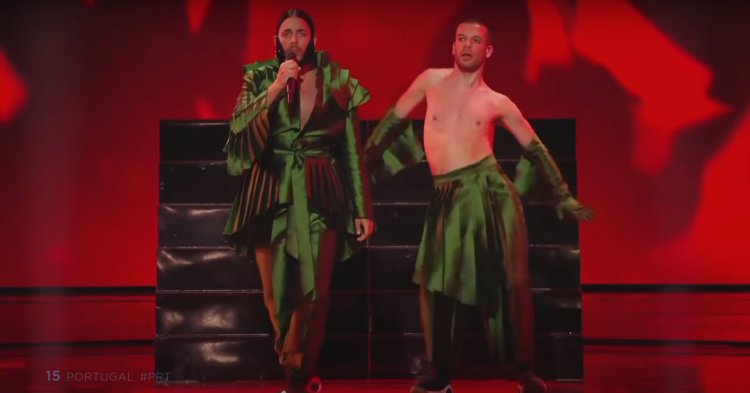The origins of the contest
For the first time since its creation in 1956 by the Director-General of Swiss public television, Marcel Bezençon, the 2020 edition of the Eurovision Song Contest was cancelled due to the Covid-19 pandemic. Whilst the competition’s final, a hotly anticipated moment of yearly European television, did not take place, a program paying tribute to the victims of coronavirus was organised amongst the participating countries. Sadly, however, it struggled to record satisfactory viewing ratings, capturing only a 7.5% share of the national audience in France.
Since its first edition in Lugano, Switzerland, the contest has developed considerably and has expanded from 7 founding countries to 41 competing countries today. Eurovision, commonly perceived as an exclusively European event, actually groups together a number of countries outside of the European Union, as the contest is open to active members of the European Broadcasting Union (EBU) located in Europe, Asia and Africa.
The audience and the rules
Other than the diversity of its entries, this musical competition is unique in being broadcasted live and simultaneously by all participating and broadcasting countries. It is mainly for this reason that not all countries wishing to participate can become candidates. In 2005, Lebanon was forced to withdraw from the EBU after wanting to take part in the competition. This refusal can be explained by the Lebanese Constitution, which prohibits the promotion of all Israeli products, and therefore didn’t permit the broadcasting of the Israeli song in Lebanon.
Although deemed a bit tacky, Eurovision attracts a considerable television audience each year, with more than 204 million viewers in 2016 and 182 million for the most recent edition held in Tel Aviv. Even though the television audience is in decline, it’s worth noting that the final is also broadcast on YouTube, which accounted for no fewer than 40 million viewers in 2019. Given the opportunity the competition presents for even the smallest countries to promote themselves, Eurovision has become a real demonstration of soft power It is structured around national identities, but also around the artistic styles that countries wish to put on display each year. On top of this weighs the tradition that the winning nation has to host the following year’s competition. Having won in 2018 with Netta Barzilai, Israel took advantage of the opportunity to try to redeem itself in the eyes of its international partners in light of the conflict with Hamas in Gaza.
One of the other founding principles is the idea that each country has a vote - however, the voting system differs to the one that characterises the European Union! Since 1999 the “Big Five”, that is, the most financially contributing nations to the EBU – Germany, Spain, France, the United Kingdom, and Italy (since 2011) – have been granted special status whereby they are automatically guaranteed a place in the final. Therefore, there is less at stake for these large European countries when it comes to displaying their economic and cultural power, than there is for countries such as Montenegro or Azerbaijan.
One of the advantages for these smaller countries, however, remains in the alliances they form with their geographic or historic neighbours. Solidarity among Northern European countries has been observed since as early as the 1970s, for example. Meanwhile, countries that make up the post-Soviet Eastern Bloc and central Europe also align themselves when it comes to the allocation of votes.
A political competition ever since its creation
Article 2.6 of the EBU regulation establishes that the event is apolitical. But how is it possible to prevent art from taking on a political dimension when there are burning issues at hand? Since 1956, Europe has experienced a number of political upheavals, and Eurovision has often been the reflection of them. Artists and political leaders have never failed to put a political spin on this artistic get-together, reflecting national affairs.
In 1964, a banner reading “Boycott Franco and Salazar” denouncing the two authoritarian regimes was bought on stage which sparked controversy. Similarly, in 1968, Francoist Spain excluded the renowned Catalan singer Joan Manuel Serrat from the competition in favour of Massiel who sung “La la la” in Castilian (i.e. Spanish) as opposed to Catalan. More recently in 2009, the conflict in South Ossetia was brought to the competition when Georgia entered the song “I don’t wanna put in” in response to the Russian invasion of the Georgian region. After its disqualification and subsequent refusal to enter a new song, Georgia was eventually eliminated.
Queer representation
Eurovision is undeniably a highlight of European cultural life, with 41 different artists and cultures sharing the same stage. According to several research studies such as those by Brian Singleton from Trinity College, Dublin, many Eurovision fans identify as queer. In the article from 2007’s SQS Journal, a professor examined the sociology of Eurovision fans and explained that the competition started in the 1950s and 60s as a relatively moderate musical event. Then, the popularity of disco in the 1970s introduced an eccentricity to the competition that it has never since lacked. It is notably due to this eccentricity – of the artists, their performances and their costumes – that the programme has accrued some criticism from French commentators, as well as its reputation for being “corny”.
Having become a window to the world for viewers who have access to only a few national channels, this evening of television is significant for the many levels of cultural diversity it represents. The victories of trans woman Dana International in 1998 with “Diva”; of Marija Šerifović, who is homosexual, in 2007 and of drag queen Conchita Wurst in 2014 have marked the contest as an openly gay-friendly show. However, not all participating countries support this LGBT representation. Among other traditionally more conservative countries is Russia, which was very critical of Conchita Wurst’s victory.
Beyond the richness of its artistic performances, over the years Eurovision has become a reflection of European and international political issues. From neighbourly policies to armed conflicts, the competition, although not an institutional project, has often reflected the political situation of its participants. Eurovision, a highlight of European culture, is today a place for all participating countries to manifest their power and identity.



Follow the comments: |
|
